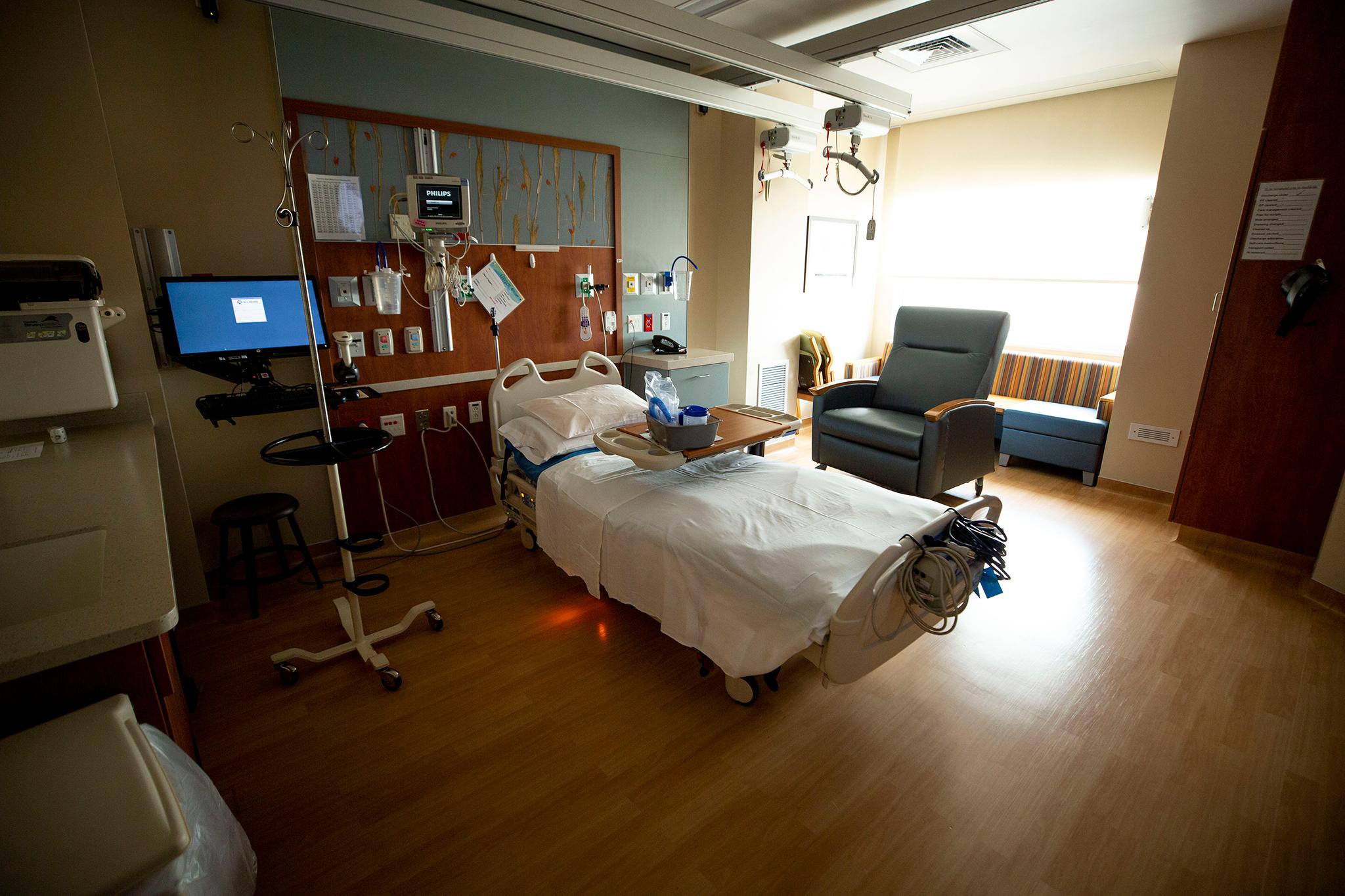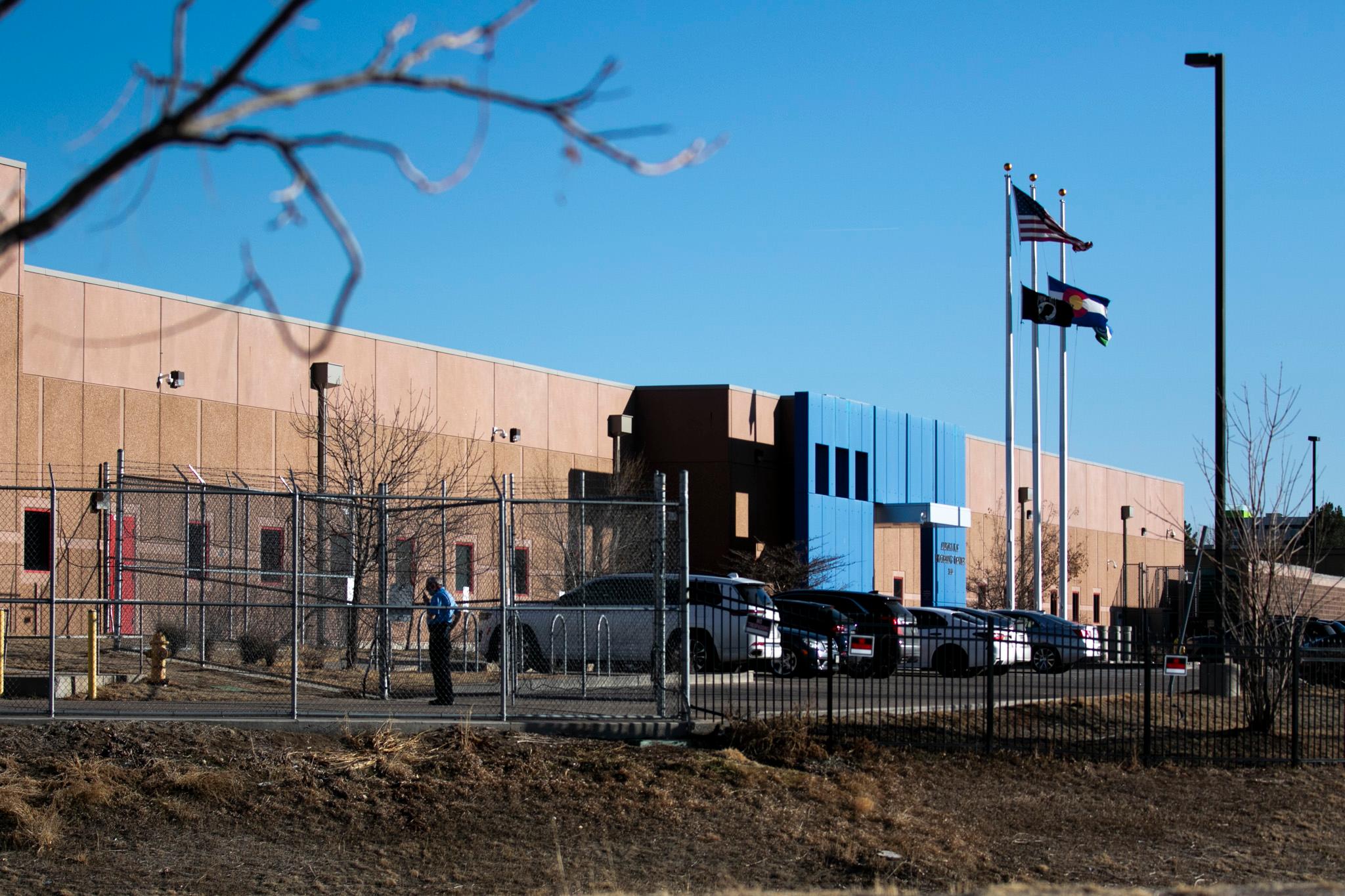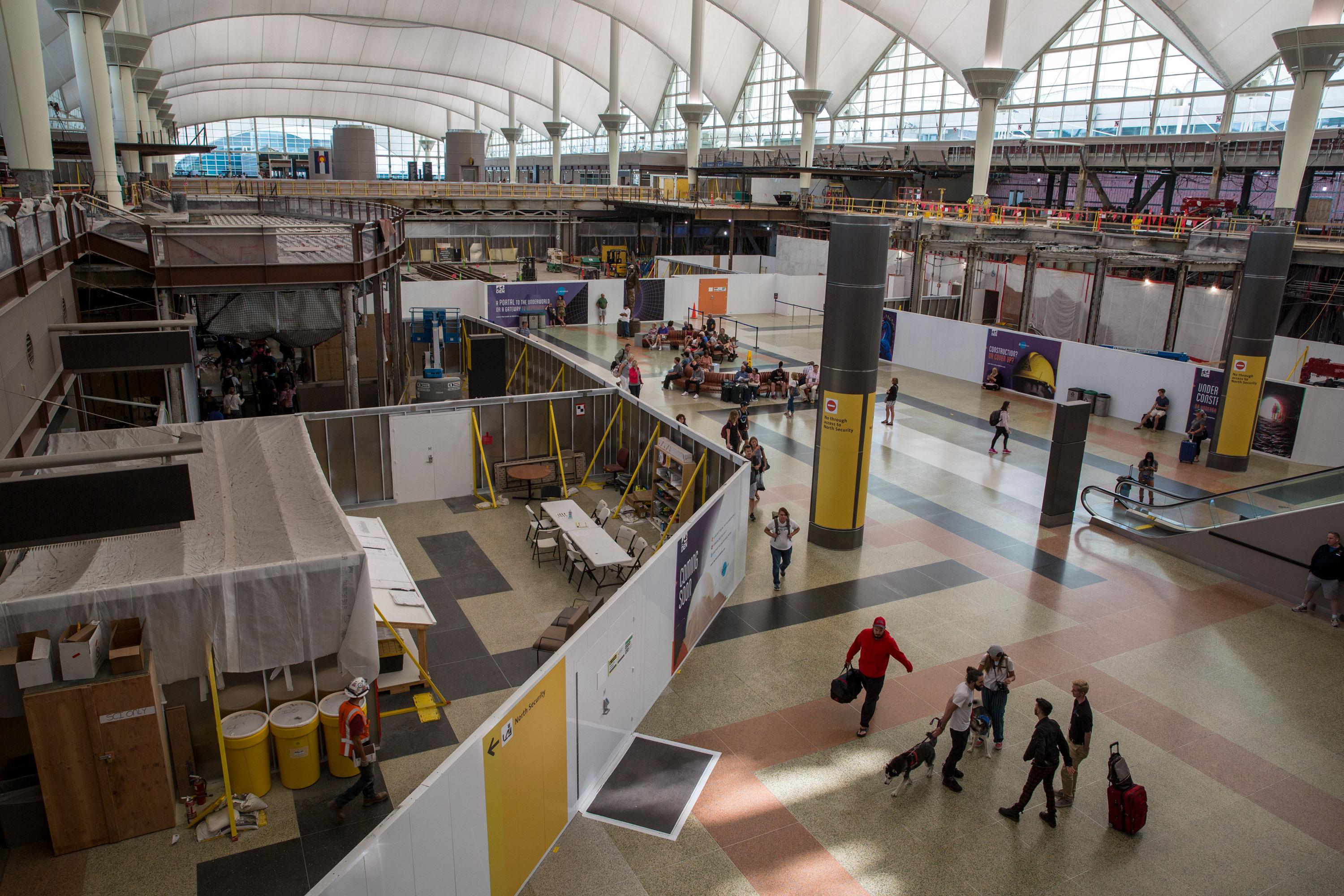
You may have noticed some … disruption to business as normal inside Denver’s airport. Because it’s a tangled web of contracts, disagreements and timelines, we’ve written this as a reasonably up-to-date guide to what’s going on at Denver International Airport.
UPDATE: 2/27/2020
The final cost of DIA’s renovation project is still unknown, but CEO Kim Day doesn’t consider the city terminating its agreement with its contractor a failure.
“I don't see us having any hiccups except we terminated a partner in year one of a 34-year contract that wasn't doing well. And I call that a success,” she said in an interview with Colorado Matters. She declined to comment further on what her involvement was like with the ordeal.
When all is said and done, she said she expects the new cost of DIA’s renovation to range between $170 and $210 million. The project should be complete by the end of 2024.

Taxpayers will not pay for the renovations, Day said. The funds will come from the money DIA makes off things like passenger fees, parking and vendors inside the airport.
“We take in over a billion dollars a year and that's the money that's going to build this facility,” Day said. “We are an asset. We are certainly not a drain on the economy.”
The airport has three goals it wants to accomplish with the project:
- Safety and security: Day said TSA’s security checkpoint needs to be moved to a more private space. Screening is currently done in the airport’s Great Hall, which travelers can see from a floor above.
- Growth: DIA is adding more gates and that means the airport needs more terminal capacity.
- Aging facility: DIA is 25 years old, and Day said the aging facility needs upgrades.
Security screening will be changed dramatically when the project is finished. Passengers will wait in vestibules with a group of 40 to 50 people.
“There will never be these big lines again,” Day said. “TSA is working with us to do what they're saying will be the new prototype for security in this country.”
A portion of the Great Hall is expected to remain open to people who aren’t ticketed to meet friends or family.
Some travelers have complained about waiting in long lines since the construction began and then stalled after the city fired its contractor. Day said in surveys, most passengers say they don’t notice the construction.
But to help with congestion, the airport has created a stopping point off Peña Boulevard where travelers can check their bags in for free and go straight through security when they arrive to DIA. They also moved ride-shares to level 5 with other commercial vehicles.
Day said longterm growth plans include expanding Concourse C and creating a Concourse D, which would mean building out the underground train.
The airport is prepared to deal with Coronavirus, but it doesn’t expect to take any immediate action.
— Hayley Sanchez
UPDATE: 2/19/2020
Denver hired a company for $195 million to make the airport’s Great Hall great (or at least finished)
The renovation of Denver International Airport’s main terminal will restart in March, more than six months after the city government fired its original contractor.
DIA’s new timeline comes with a new team of architects and builders led by Hensel Phelps, a firm with its hands in several local projects. Denver City Council members approved a contract with the company worth up to $195 million Monday.
Hensel Phelps and its subcontractors are tasked with finishing the first phase of the Great Hall makeover: a new check-in area, new airline ticket counters, wider balconies, new escalators, and four new bathrooms, all on the sixth floor. Airport officials say it should be done sometime in 2021.
Phase one is only about 25 percent finished, airport officials told city council members earlier this month. Hensel Phelps faces penalties if it doesn’t reach milestones set by DIA.
Airport officials are “committed to completing this project in a responsible way” and are ready for Hensel Phelps to “take the baton and restart the construction,” airport CEO Kim Day told council members earlier this month.
The cost of the entire Great Hall renovation is estimated at $770 million.
The contract does not cover DIA’s new screening and security areas — the impetus for the entire renovation.
“If we short-change anywhere, it should not be on that,” Councilman Kevin Flynn said. “I don’t know how much scope reduction is required before we stop calling it the ‘Great Hall’ and start calling it just the ‘Good Hall.'”
Airport officials say they’re working through a timeline on that piece of the project, which was stopped short when the original private-public partnership imploded last August. Disagreements over costs and timelines between the city-owned airport and Great Hall Partners, led by Spanish company Ferrovial, ended that relationship.
Instead, travelers are still guessing on the progress of DIA’s Great Hall. It is not fully designed and it’s unclear who will handle later phases.
“As we’re doing all this (phase one work), we’re going to continue the process of defining that future phase or phases,” DIA vice president of special projects Michael Sheehan told council members. “We really have our sleeves rolled up on this project and are really working very around the clock to make sure we finish this.”
Airport CEO Kim Day is “confident” this piece will be finished in 2024.
“I think were all really anxious to get these improvements finished and let us focus on the work that we do of moving people around and adding more flights and eventually adding an additional runway and some of that stuff that has allowed this to be the incredible economic engine that it has been for the whole Front Range.”
UPDATE: 10/17/2019
A new set of contractors will take over the airport remodel, according to a DIA press release.
Airport officials selected Stantec to do design and Hensel Phelps for construction management. Details will be presented to a Denver City Council committee on Nov. 6. If the city council approves, work could begin in the first quarter of 2020.
The massive renovation of DIA's main terminal, under the white tents, ended abruptly in August when airport officials terminated Great Hall Partner's contract mid-construction. The airport said the contractor was hopelessly delayed and had serious safety issues at the site in violation of the airport's core values.
"Both Stantec and Hensel Phelps were selected because of their commitment to these values while also bringing thoughtful proposals with creative cost-savings ideas to the table," said DIA CEO Kim Day in a statement. "We are pushing ahead so we can get back to work on the Great Hall project with our new partners.”
The renovation project kicked off in 2018 to move security lines off the fifth floor, up to the area near the sixth floor's largely-vacant ticking counters. The Great Hall would then be opened up to high-end retail and restaurants for travelers that have moved past security.
DIA focused on contractors who have current experience working at the airport to take over quickly. The remodel has largely stalled with major sections of the terminal in a state of deconstruction and cordoned off from travelers.
Hensel Phelps will manage only Phase 1 of the remodel, pending city council approval. The airport has yet to determine who will take over the remainder of construction.
Airport officials said they remain committed to the completion of the project for the original $770 million approved by Denver City Council. That includes a more than $100 million contingency fund built into the previous contract. Taxpayer money isn't directly at risk at DIA, the airport is funded by airline fees and revenue from parking and restaurants.
The big picture: The construction is meant to move security lines to a less exposed location.
And they want to open up the Great Hall — the space under the famous white tents — which was originally designed to be “a traveler oasis,” said Kim Day, CEO of Denver International Airport.
“This was a place that was comfortable, it had trees and water. And it was a place you could relax and de-stress,” Day said at a ceremony last year, marking the beginning of construction. “It used to be [travelers] were satisfied with a hot dog that was rolling on a spindle. Today? Doesn’t work that way.”
The new open hall design will allow the airport to add higher-end retail and restaurants where travelers would spend more money. Kind of like these simulated people are doing:
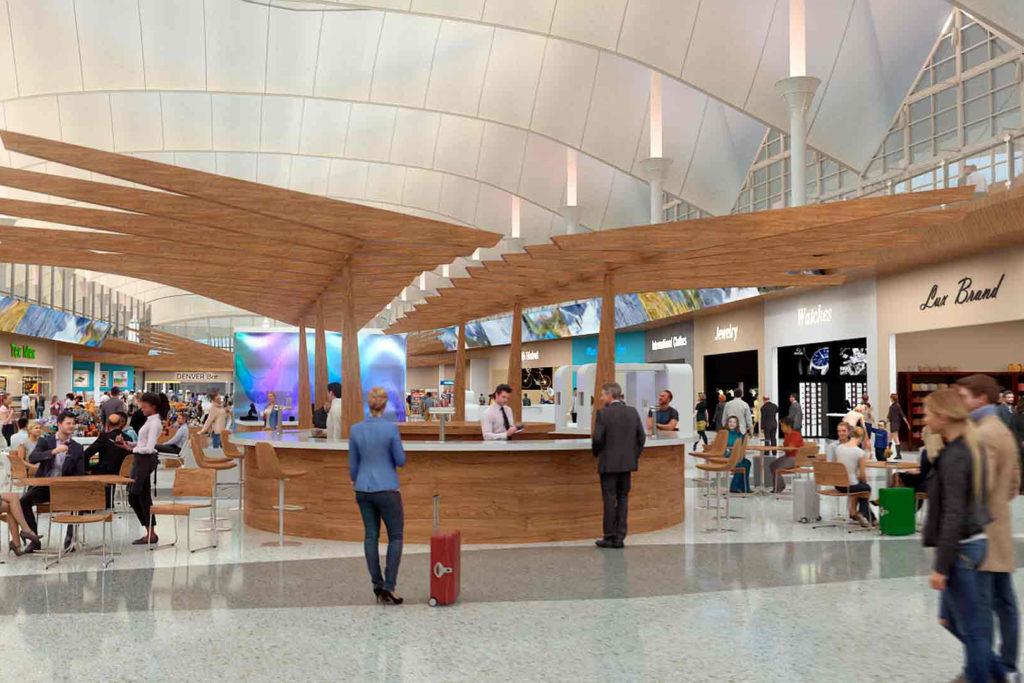
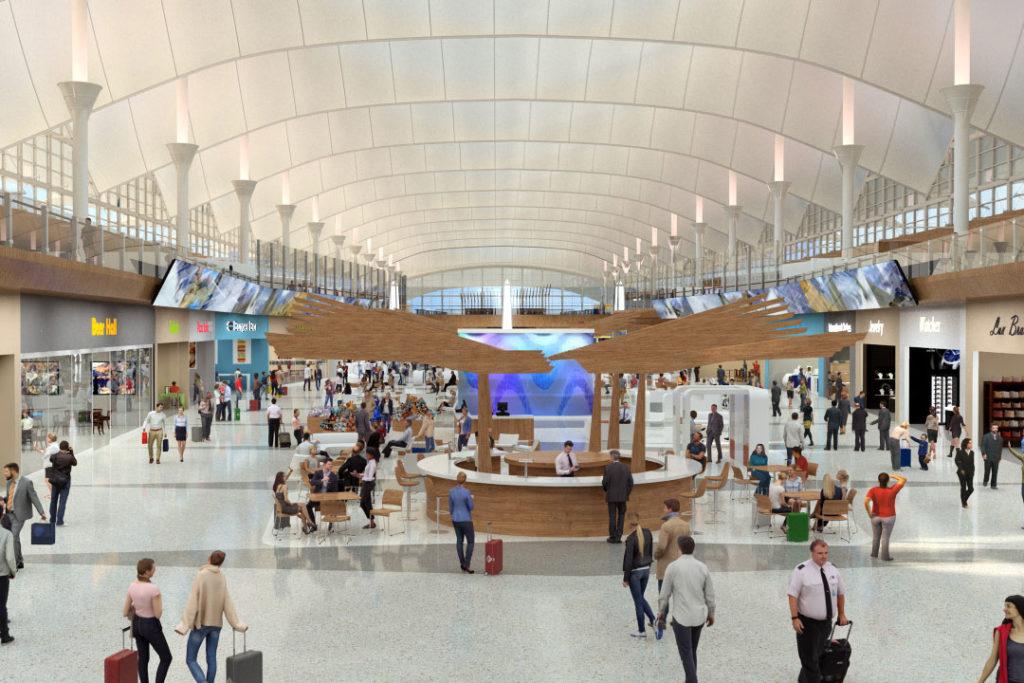
As you can see in the renderings above, there are no security lines crowding the main floor. This is perhaps the most critical reason for rehabbing the interior.
The current security line setup, put in place post-9/11, is in an exposed position in the terminal, within view from an upper floor. The lines will be moved from the 5th floor and up to the 6th floor by the ticketing counters. Many counters are vacant today as many passenger come with boarding pass in hand.
Here’s where we are right now.
Construction came to a stunning halt after the city fired its contractor this summer.
Late in the evening on Aug. 12, Denver Mayor Michael Hancock gave the OK to terminate the $1.8 billion dollar contract amid accusations of sloppy construction, safety lapses, and disagreements over delays and cost overruns. Hancock said he took the extraordinary step to prevent “irreparable damage” to the airport.
The project continues to sit in limbo with unfinished work left behind white walls that snake through the terminal. Now, questions swirl about who will finish the project, when it will be done and how much it will cost.
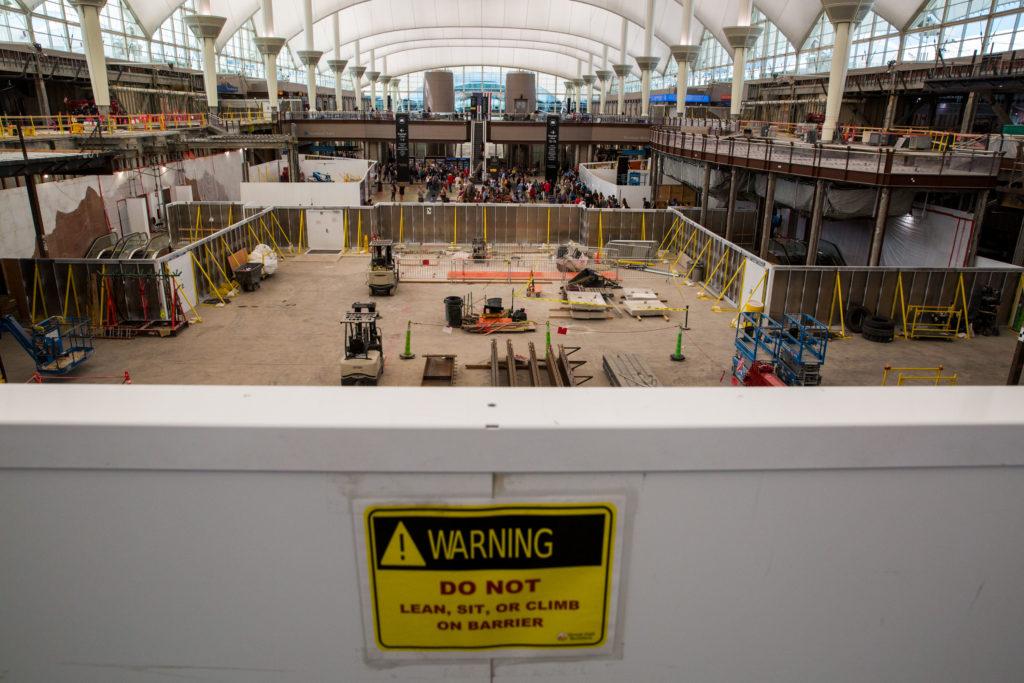
Here’s what’s next.
While, DIA has hired a pair of contractors to finish design and Phase 1, it's not clear what's in store for future phases of the project.
The new contractors, Stantec and Hensel Phelps, will get their first look at the site to determine immediate next steps on Nov. 13. The termination of the current contract with Great Hall Partners — a partnership between Ferrovial Airports, Saunders Construction and JLC Infrastructure — is effective Nov. 12, when they must be completely off the job site. Ferrovial and its subcontractors have until that mid-November date to vacate the job site. The company has agreed to do so in an orderly and professional way.
The airport will owe Ferrovial, and its partners, about $200 million to get rid of them, and it’s unclear how much is for work already completed, how much is for the financing Ferrovial secured, and how much is any penalties associated with terminating the contract.
DIA CEO Kim Day has said the airport will stay within the $770 million budget originally approved by city council. But she also admits that the airport will have to change the scope of the project to make it fit within the budget. And the original $770 million figure includes more than $100 million in contingency money.
It’s still unclear just how long it will take to finish the work at the airport, and how many more years travelers will be inconvenienced.
How did we get here?
In early 2015, Denver announced the renovation project, noting that moving the security lines, which ballooned after 9/11, to a less exposed location was the airport’s highest priority. The airport narrowed the list of potential contractors down to three — Ferrovial (a Spanish infrastructure giant), Westfield Airports and Den Transformation Team. By June of 2016, Ferrovial was picked for the job.
At the time, Ferrovial and its partners, including Colorado-based Saunders Construction, were, in the airport’s estimation, the best contractor for the job. An independent panel and four committees were set up to evaluate and score the proposals. Ferrovial outscored the other two developers, with the airport saying at the time that their plan, “best achieved a visionary look for the terminal while staying true to the needs of an operating airport.”
When announcing the termination of the contract recently, DIA CEO Kim Day said the airport did not make a mistake hiring the developer.
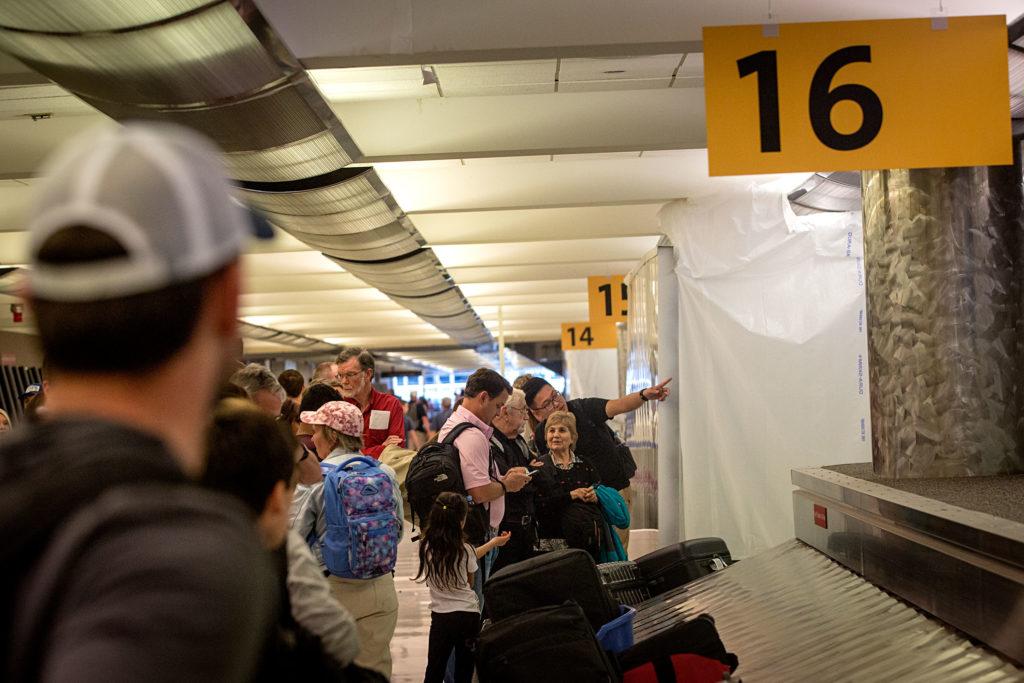
“We had an intense procurement process, we had outside people from the community and experts who helped us to pick the developer that we thought was the right one to go forward,” she told CPR News.
Still, some on Denver City Council had concerns. In announcing her “No” vote on the contract, councilwoman Debbie Ortega cited “the extremely limited time (one week) to review” the contract, which “including financials … written behind closed doors and never fully provided to City Council.”
The only other “No” vote was from then-Councilman Rafael Espinoza, a former architect.
“What they’re doing is a ‘yes.’ How they’re doing it is a question mark,” Espinoza said after the vote.
He questioned what he called a luxury contract, with a $100 million-plus contingency fund. And he took issue with the public-private nature of the deal. Ferrovial agreed to finance a portion of the construction in return for management rights and a slice of the retail proceeds for three decades.
In the end, the contract was easily approved as a super majority of the council agreed with the airport that the project was necessary for the airport’s future success.
Ferrovial broke ground on the project in the summer of 2018.
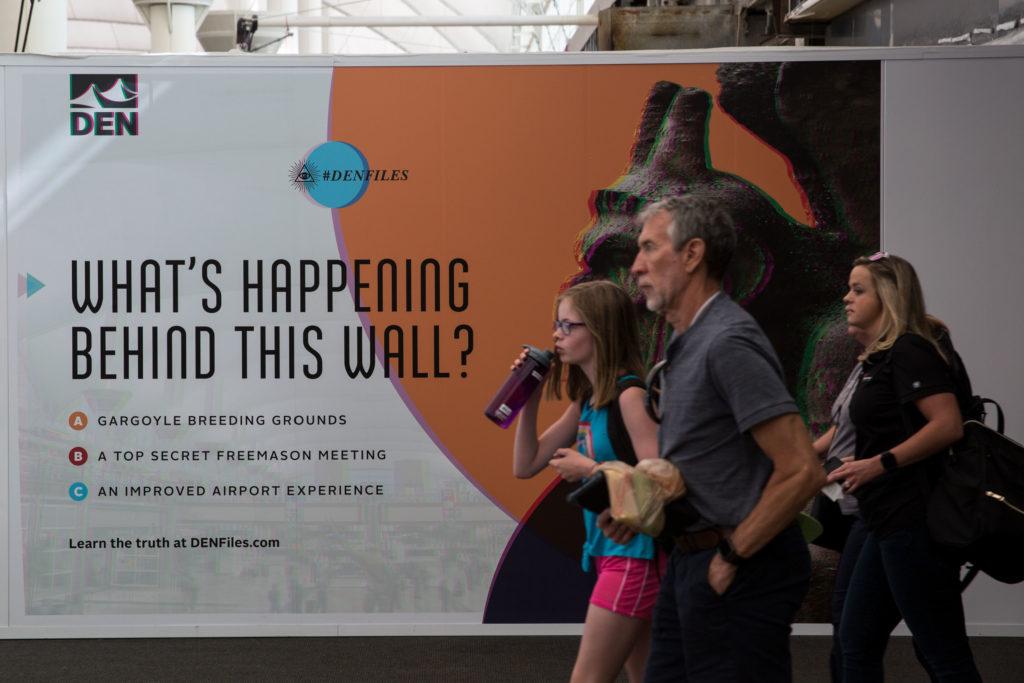
The relationship between DIA and the contractor got rocky quickly.
Even before the groundbreaking ceremony, featuring NBA Hall of Famer Magic Johnson (his investment company helped finance the project), the contractor was already sending warning signs that something was wrong. In a May 2018 correspondence to the airport, Ferrovial said delays were mounting, blaming “the multitude of Owner Changes being issued on the project.”
A year later in May 2019, CBS4 broke the story that the construction could be delayed by four years and cost an additional $310 million, because of, according to Ferrovial, airport-led changes to the design and weak concrete in the original construction of the building in the ‘90s. The city contracted a third party who reported that the concrete needed additional testing but was fine to build on. Ferrovial maintains the concrete problems were a legitimate issue and reason for delay.
In July, the war of words between the two sides escalated as DIA accused the contractor of breaching its contract and threatened to end things. The airport had issues with the contractor over the project’s timeline, costs, diversity and safety.
About two weeks later, DIA announced it would terminate the contract.
Do you have specific questions or observations about DIA? Email [email protected]
Denverite reporter David Sachs contributed to this story.





